MLK Day: How you're being lied to about King's stance on guns and the history of gun control
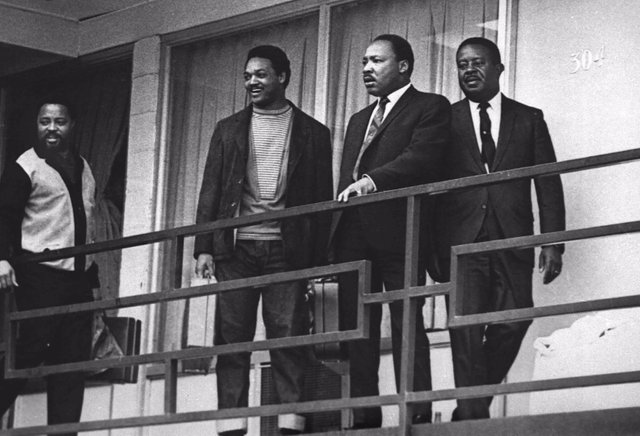
This MLK Day, don't be surprised if you see many in the media, once again, falsely capitalizing on Dr. King's legacy to promote their gun control agenda.
While it's true that King's preferred tactic in regard to the civil rights movement was one of non-violence, he was not a pacifist when it came to his own personal safety and the safety of his family. Contrary to the media's tendency to equate guns with racism, it was laws like this that actually worked against the late civil rights leader, as well as all blacks throughout the history of gun control in America.
On January 30, 1956, King's home was bombed while he spoke at the First Baptist Church in Montgomery, Alabama. Upon learning the news, he rushed home to find his home surrounded by white cops and angry blacks carrying firearms. After rushing inside to find out his family was okay, King came outside and said to the crowd, "Don’t do anything panicky. Don’t get your weapons. If you have weapons, take them home. He who lives by the sword will perish by the sword. Remember that is what Jesus said."
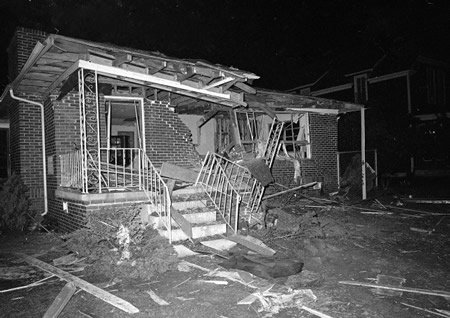
King likely realized that Jesus also told his apostles, "If you don’t have a sword, sell your cloak and buy one.” Just like Christ advised his disciples during his ministry, King's pacifist stance pertained to the civil rights movement only, and was not an absolute rule, as King made clear when he addressed the matter in the second chapter of Where Do We Go from Here: Chaos or Community:
"Finally, I contended that the debate over the question of self-defense was unnecessary since few people suggested that Negroes should not defend themselves as individuals when attacked. The question was not whether one should use his gun when his home was attacked, but whether it was tactically wise to use a gun while participating in an organized demonstration. If they lowered the banner of nonviolence, I said, Mississippi injustice would not be exposed and the moral issues would be obscured."
What makes the point even clearer — the dirty little secret that the anti-gun lobby tries to mask over — were King's own actions that he took privately regarding firearms. Many may think that King was a complete pacifist that abhorred the ownership of firearms—quite the contrary.
In fact, King applied for a license to carry a concealed firearm soon after the bombing of his home. The Montgomery Police Department had the final say on whether to issue these permits though. As might be expected in the South, which was still under Jim Crow laws at the time, King's application was denied. That does not mean that King went unarmed though.
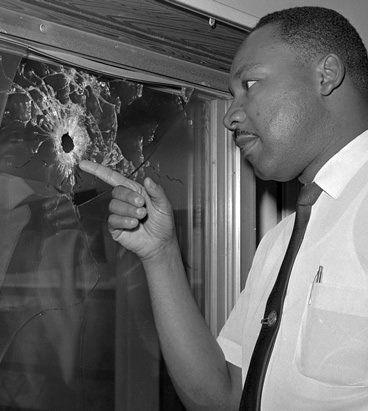
Months after the bombing of King's home, Baltimore reporter William Worthy remarked that he went to sit down on a chair in King's house and almost sat on a loaded gun. Additionally, Rev. Glenn Smiley, a white civil rights activist who visited King and advised him on the tactic of nonviolence in protests, is well known to have described King's home as an "arsenal." It's also a well-known fact that King, who was the target of frequent death threats, often had his house guarded by armed supporters.
You would think that one of King's most prominent protégés would know better. However, Rev. Jesse Jackson's Rainbow PUSH Coalition joined in on MLK Day 2013 to completely contradict King's legacy. At the site of a future Wal-Mart in Southfield, Michigan, Jackson's group sponsored a protest, that was named "Jobs In, Guns Out," aimed at convincing the City of Southfield to demand that guns and ammunition not be sold at the new store.
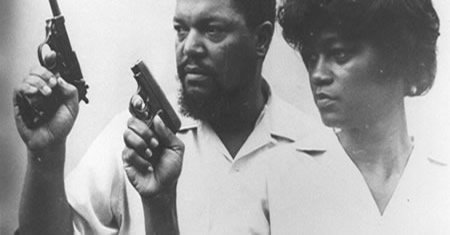
The latest tactic of the gun grabbers in recent years, as is the case with most any position they oppose, is to throw up a giant smokescreen by equating the support for gun ownership to racism.
"So you won't give up your guns until they pry them from your cold, dead hands? You know that's code for racism, right?," is the gist of their argument. And you can hear this argument fleshed out left and right (albeit mostly left) in the media.
These pundits employ a number of mental gymnastics techniques to make their supposed point, and are widespread in America's newspapers, magazines, talk radio, and cable news. But to provide you with just one good example among many, check out New York Times columnist and Notre Dame philosophy professor, Gary Gutting's opinion piece, "Guns and Racism," where he writes:
"The case for the racist effect of our permissive gun laws is especially powerful. There’s no way of explaining away all these deaths as aberrations. If we fail to oppose with equal passion and vigor the relentless political pressure of (mostly white) gun advocates, we force a large number of black citizens to live with the constant threat of gun violence. We’re in effect letting the Second Amendment trump the Fourteenth Amendment, implicitly preferring the right of gun ownership to the right of black people to live free from fear."
Statements like this coming from a person with a Ph.D, makes some of us wonder whether people like Gutting are incredibly ignorant, or just plain liars. Anyone who knows the slightest bit about the earliest history of the civil rights movement should know how ludicrous the connection of gun ownership to racism against blacks is, because the history of the matter is actually the total opposite of how gun controllers represent it.
The earliest advocates of gun control in America were Southern whites who wanted to disarm all blacks. In 1680, the Virginia General Assembly enacted a law that made it illegal for any black person to carry any type of weapon — or even potential weapon. In 1723, Virginia law specifically prohibited black people to possess “any gun, powder, shot, or any club, or any other weapon whatsoever, offensive or defensive.”
These were laws from the colonial era, but even after the Constitution of 1789 and its Second Amendment, the same pattern continued, especially after the Civil War. Southern whites reacted to the abolition of slavery through a variety of state and local laws that restricted every aspect of the lives of black Americans. Gun prohibition was a common theme of these ‘Black Codes.’ When the Black Codes didn't work well enough, the Ku Klux Klan and other groups came about during Reconstruction to wage a war on freed blacks, and gun control was part of their agenda.

But while many white people were opposed to the idea of black people with guns, black support for gun rights was very high into the 1960s, right up to the point where the civil rights movement boiled over into violent protests, and black radicals defied the boundary between peaceful resistance and political violence.
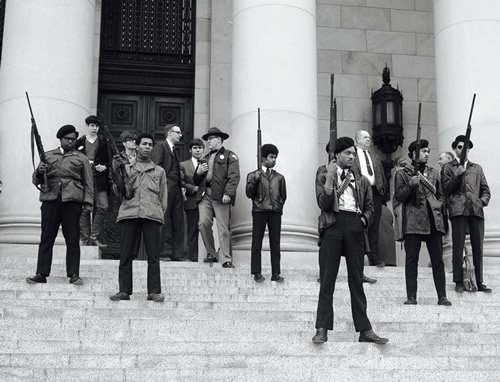
Only after that point, was there an about-face as the movement ushered in a new black political class. Rising within a neoliberal political coalition that included the new gun control movement, this new black political class embraced bans on firearms. By the mid-70s, this crowd had replaced the generations-old black tradition of arms with a the more recent stance of support for gun control.
This is all well-known, well-documented, mainstream history.
So, far from being the liberators of blacks that these gun control advocates and their cronies in the media pretend to be, they're truly the complete opposite, and they're bold-faced liars as well. And Dr. Martin Luther King, Jr. is the very last name they should invoke in their disarmament crusade.
Dr. King, was a black man, a civil rights leader, a man who promoted non-violence, and who received death threats constantly, and he was still not deemed worthy of a concealed handgun permit—by the state. That's proof that any notion of needing to ask the government for permission before exercising a right is totally flawed, just like the propaganda that's spouted every year during the holiday in Dr. King's honor.

I'm Clay Rains, a former broadcaster and current convergent media student at Missouri Western State University. If you like what you've read, then please upvote and share this article on social media, follow me here on Steemit, and subscribe to my journalism page on Facebook by clicking "like" on American Objectivist! Also, please hit the "Resteem" button below and share this article here on Steemit!
This post only made 20 cents? Steemit your neoliberal bias is showing
About the Bible quote I have looked it up and found this very interesting article, perhaps you should look at it, tell me what you think.
http://www.ukapologetics.net/swords.html
Nicely written; followed
I have heard the claim that the Black Panthers evolved from the armed self-defense groups of Black Americans in the South. I've never studied this for myself, but it sounds like something you may know; it doesn't sound right to me, in part for the following.
In the followup investigations to the mid-60's riots, it became clear that SDS/SNCC were assuming leadership roles in the civil rights movement with the goal of stopping peaceful assimilation in favor of creating revolution.
For urban street gangs to suddenly become political revolutionaries seems off the path of local communities defending themselves.
I don't think they evolved in any direct way, but that's probably somewhat true. The Black Panthers started in Oakland, and the South was where most blacks in Southern California moved from in the 50s and 60s. Huey Newton and Bobby Seale both moved there from the South. The full name they gave the party was the Black Panther Party for Self Defense, so it's pretty likely they may have been influenced by similar groups like that in the South. As far as the other two groups, I'm not sure but some of those may have been infiltrators with the FBI. I know that was what J. Edgar Hoover tried to do. Other than surveillance and the rest of what they did to work against the Black Panthers, they infiltrated their ranks and would incite them to violence to damage their reputation. Thanks for checking out the article and for the follow!
Great post! I would suggest next time you include sources and make it go on the trending page as it deserves too!
Thank you. And you're right. I REALLY would have liked to have expanded on it, plus include sources and hyperlinks. I usually do, but I have so little time to write anymore, and I was kind of struggling to get it written before MLK Day that I didn't get time. If I can manage to get time to add to it before my window to edit it has closed, I probably will. If not, I'll have an improved version by next MLK Day for sure. Thanks again! Feel free to share it by the way!